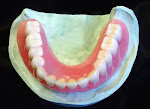
Tooth decay is the destruction of the enamel (outer surface) of a tooth. Tooth decay is also known as dental cavities or dental caries. Decay is caused by bacteria that collect on tooth enamel. The bacteria live in a sticky, white film called plaque. Bacteria obtain their food from sugar and starch in a person's diet. Tooth decay usually does not cause symptoms until you have a cavity or infected tooth.
When this occurs, symptoms include:
- Toothache.
- Bad breath or a foul taste in the mouth.
- White, gray, brown, or black spots on the teeth.
- Loose fillings.
- A broken tooth
- A tooth that is sensitive to pressure.
The pain may become worse when you:
- Eat sweets.
- Eat hot or cold foods or drink hot, cold, or acidic liquids, such as citrus drinks.
- Chew food or gum.
- Breathe in cold air.
- Brush your teeth.
Severe tooth decay may cause a pus-filled sac to form in the bone at the base of a tooth. Symptoms of abscess include:
- Fever.
- Swollen glands.
- A swollen jaw.
- Deep, throbbing pain.









No comments:
Post a Comment